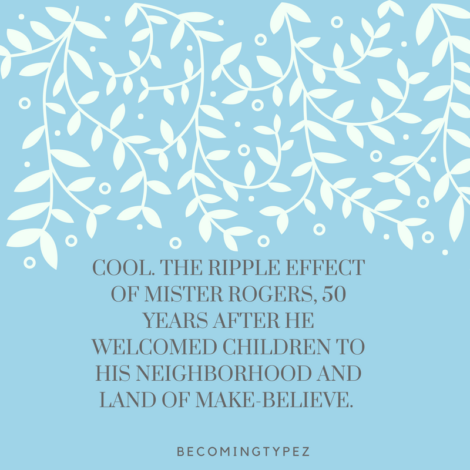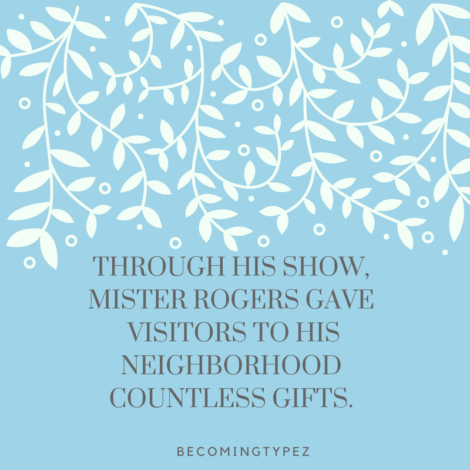Recently, it seems everywhere I look, Mr. Rogers is trending. On social media, friends post inspirational memes of Mister Rogers smiling wide, reminding people to “look for the helpers.” Others share videos from his show that promote kindness and inclusion. I remember thinking, Mr. Rogers? For real? Until recently, I hadn’t given Mr. Rogers or his neighborhood much thought. When I was a kid, I rarely visited “the Neighborhood.” I was a Captain Kangaroo kid. I loved the people who lived in the animal cracker box. And when ping pong balls fell on Mr. Moose? That was hysterical. As I got older, and a premium was placed on being cool, I tuned in to the PBS alternatives, The Electric Company and Zoom. I prided myself on doing a spot-on Rita Moreno, “Hey you guys!” impression and speaking fluent Ubabubby Dubabubby.
But all of the hoopla about Mister Rogers’ Neighborhoodturning 50 this year caught my attention. As did the man, himself, Fred Rogers. I started feeling that maybe I’d missed the boat on something special. Twice. First as a child, then as a parent. I’d prided myself on limiting my kids’ media consumption, choosing their TV carefully. My preschoolers watched Sesame Street, Teletubbies and Blue’s Clues. Mister Rogers’ Neighborhood had evaded my radar, altogether!
These past few weeks, I’ve done a deep dive into Mister Rogers, the man and the show. I started with Amy Hollingsworth’s book, The Simple Faith of Mister Rogers, an inspiring read that sheds light on the man behind the cardigan. And last week I jumped at the invitation to see the documentary, Won’t You Be My Neighbor? Both the book and the movie showed that Fred was Mister Rogers and Mister Rogers was Fred; a very special person, indeed.
As the credits rolled and my friend and I made our way to the parking lot, we marveled at what an amazing man Fred Rogers was and what a profoundly positive impact he had on generations of children, even if we couldn’t count ourselves in that number. I felt a twinge of sadness over what could have been. But we had been touched as adults. The last hour and a half had been incredibly impactful. As we talked, we decided that it was better to come to the Mister Rogers party late, rather than never having come at all.
Through his show, Mister Rogers gave visitors to his neighborhood countless gifts. Here are my favorites:
- The gift of slowing down. Fred spoke slowly and purposefully, heeding the yellow traffic light that flashed as the opening song played. Wouldn’t we be more effective parents, teachers, communicators if we, too, slowed down? Chose our words carefully, held space, allowed time for our words to be truly heard and processed? We educators say that kids deserve the gift of time and we use the term, “wait time,” in our classrooms. Yet we jam our everyday lives with so many things to do, rush from one thing to another. I think we could all benefit from heeding the yellow light rather than trying to make it through the green.
- The gift of expression. Fred talked a lot about feelings during his show. Because feelings matter. And children need to be taught how to express their feelings, be given the opportunity to discuss how they feel, even when the feelings are icky, uncomfortable for us, the adults. Allowing children to express their feelings in a safe environment helps our kids to feel safe, grow, become confident.
- The gift of song. Fred, an accomplished musician, incorporated music into each episode. Because music helped him process his feelings, made him feel better as a child. I’d argue the power of music holds true. Walk through the halls of an elementary school; you can hear kindergarteners joyfully singing about vowel sounds, primary kids choral reading poetry, chanting math facts, and bigger kids persevering to solve challenging math problems while quiet instrumentals play in the background. Notice the driver in the car beside you singing along with the radio.
- The gift of belonging. Speaking of music, Fred ended each show with a song, “You Are Special.” I love this song because of its simple message. This song does not teach, you are most special, or the only special one, as some critics have asserted. Instead, this song validates each of us for being who we are. And it reminds us that even though we are unique, which often makes us feel weird; we are all worthy, deserving of friendship and love.
- The gift of wonderment. Mister Rogers asked questions, lots of questions. Of the viewer and the people who interacted with on his show. By doing so, he accomplished two goals: promoting curiosity for life-long learning while building connections through conversation.
- The gift of validation. Perhaps the most important strategy we can take away from Mister Rogers is the importance of remembering what it was like to be a child. Many experts assert that this is why Mister Rogers was so effective in his work. Through the puppet Daniel Striped Tiger and even when speaking as himself, Fred demonstrated vulnerability and compassion. He acknowledged the difficulties of being a kid; whole-heartedly, respectfully.
Yesterday, I decided to watch an episode of Mister Rogers’ Neighborhood on pbs.org, see what I’d missed out on. In the episode, Fred explored the ocean with my daughter’s personal hero, oceanographer Sylvia Earle. I was transfixed as they talked about conservation and managing pollution. The decades-old episode that explores the responsibility of caring for our earth stood the test of time. So much so that I sent my grown daughter the link.
“Cool,” she texted in response. I felt the smile spread across my face. My millennial daughter’s response summed up the ripple effect of Mister Rogers, 50 years after he welcomed children to his neighborhood and land of make-believe. Cool.
©Kathie Z.

